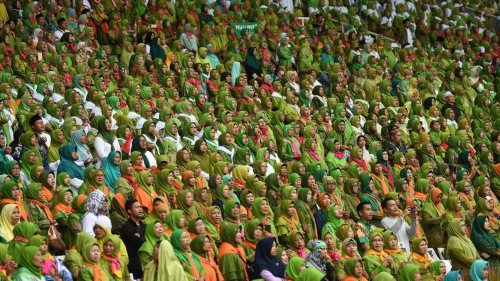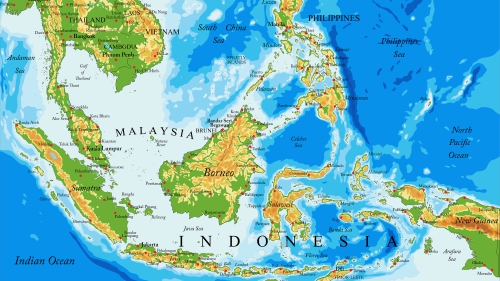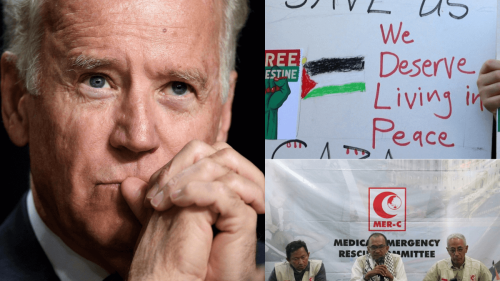Gus Dur's Exit Threatens the Future of Progressive Islam in Indonesia
Judging by the reports coming from Indonesia these days, it would appear as if the final act in a long and convoluted drama is about to be played out. As President Abdulrahman Wahid (better known as Gus Dur) battles to keep his position as the head of state in the country, the very same forces that were once aligned to him have now turned against the man who happens to lead the biggest Islamist movement in Southeast Asia.

An aide holds an umbrella as adjutants escort Indonesian President Abdurrahman Wahid to his limousine upon landing at Jakarta's Halim airport 15 May 2001. The embattled president returned home from a day-trip to Thailand. |
The relatively short story of Gus Dur's meteoric rise and graceless fall from power is the latest chapter in the often confounding story of Indonesian politics, but it also happens to be an important part in the history of the Islamist movements in the country as well. The organization that he has led- the Nahdatul Ulama- is itself so complex an entity as to defy description. Regarded by some as the bulwark of traditional obscurantism, the NU was also seen as a tacit supporter of the New Order regime of Suharto at some stage of its development. When President Suharto ordered all the parties of the country to accept the Pancasila as the basis of their ideology in 1983, practically every Islamist party in Indonesia protested against the move- except the NU, which embraced it as its asas tunggal (foundational ideology). It then chose to break away from the political arena altogether, and Gus Dur declared that henceforth the NU would be a dakwah (missionary) movement that would focus solely on the propagation of Islam in the country.
But Gus Dur's vision of Islam was itself a complex one in many ways. While the NU has always been regarded as a conservative movement with its bedrock in the traditional Pesantren system of education (akin to our pondok schools), it was also led by a number of progressive Islamist intellectuals who took on board concerns and issues that have never been touched by the other so-called 'modernist' Islamist movements in the country.
Over the past three years, the leading lights of NU have spearheaded a process of intellectual reformation from within Islam that is unequalled by any other movement in the contemporary Muslim world. One of the Kyai (Ulama) of the Nahdatul Ulama, Kyai Muhammad Hussein, has written a book entitled 'Fikih Perempuan', which happens to be the first woman-centered interpretation of fiqh (traditional Islamic jurisprudence). Another Ulama, Kyai Masdar Farid Masudi, has written at length about the reproductive rights of women and the right of women to have control over their own bodies. And another young Kyai by the name of Syafiq Hasyim has recently published a book bearing the title 'Hal-Hal Yang Tidak Terpikirkan' (Matters That Have Not Been Discussed), which also touches upon the question of women's rights in Islam. In the book the Kyai offers a deconstructive reading of hadith literature as well as a critique of the traditional modes of interpretation of the Quran and Hadith by conservative Ulama who have, according to him, corrupted the message of Islam and turned it into a male-centered religion founded on patriarchal structures of control and dominance instead.

Supporters of Indonesian President Abdurrahman Wahid wave during a demonstration in front of the Presidential Palace in Jakarta, 31 May 2001. Some 2,000 supporters massed in front of the palace demanding Wahid dissolve parliament. |
Ironically, none of these efforts would have come to fruition were it not for the revival of the NU under Gus Dur over the past few years. Being is a position to represent the Muslim masses as a whole has allowed the NU to lead the struggle for change and development from within. For a number of prominent Indonesian scholars and activist, Gus Dur was precisely the sort of accommodative leader who could bring about this internal dialogue and self-critique, without jeopardizing the name and image of Islam as a whole. For the Indonesian Islamist intellectual Nurcholish Madjid, the choice of supporting Gus Dur was a clear one from the beginning. As he puts it: 'We intellectuals need to guide him and to keep him open to alternatives. There is no guarantee that it will succeed, but if he fails and falls then we all fall with him. The whole country might go down as well.'
But now that Gus Dur may be facing his final days in power, the fate of the country and the Islamist project itself is hanging in the balance. According to Kyai Syafiq Hasyim: 'The forces that once supported Gus Dur have abandoned him because they regarded him as someone who made too many compromises. But what these Islamist organizations fail to understand is that in a democratic and plural society like the new Indonesia, we all need to learn the lesson of compromise and accommodation. Gus Dur did make concessions to non-Muslim groups and interests, but this was so that they would not be afraid of the growth of Muslim power in the country. And while he was doing this he was also opening the way for a whole new generation of young, progressive and open-minded Islamist intellectuals to come up. Now that he is vulnerable, the whole project of reforming Islam and modernizing Muslim society is also endangered.'
The winners in this sad struggle may well be Megawati Sukarnoputeri and her supporters from the democratic camp. But theirs is a weak and instrumental coalition that is united only by a common antipathy towards Gus Dur and his government. Should Megawati come to power, the balance of power may have shifted but this would certainly not bring any positive changes as far as the development of modernist Islam is concerned. As Syafiq Hasyim puts it: 'Megawati is herself weak and at the mercy of her advisors. But worse of all, none of those who support her have any real concern about modernizing Islam or reforming it from within. Should they succeed, all our efforts to bring about a change in the mindset of Muslims in Indonesia would be wasted. We will go back to the days when Islam was seen as obscurantist and reactionary, and as a result this will make our worst nightmares come true- with the emergence of genuinely militant and extremist Islamist movements in Indonesia.' And so the drama continues, though possibly with a tragic ending in store for all parties concerned.
_________________________________________________
Dr. Farish A Noor is a Malaysian political scientist and human rights activist. He once taught at the University of Malaya and is presently working on the topic of Islamist movements in Southeast Asia. His current project is a book on the development of the Malaysian Islamic Party, PAS.

















